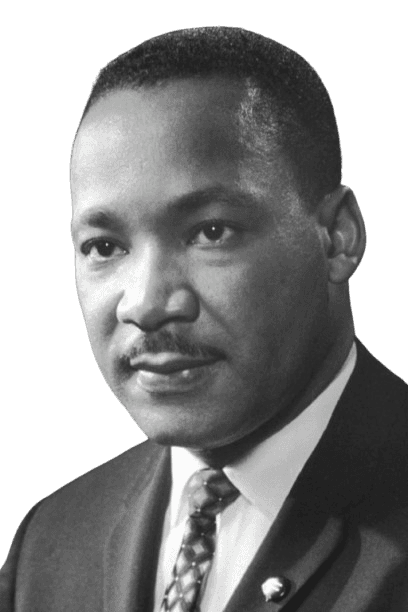Life and achievements
Early life
Martin Luther King Jr. entered the world on January 15, 1929, in Atlanta, Georgia. In 1934, Michael King Jr. and his father received new names from his father, who drew inspiration from Protestant Reformer Martin Luther. Martin Luther King Jr.'s father, Martin Luther King Sr., served as a Baptist minister and racial equality advocate, while his mother, Alberta Williams King, served as a schoolteacher. King was the middle child in his family, including his older sister, Christine, and his younger brother, A.D. He spent his youth under the religious influence of his parents in a disciplined household.
The experiences of racial segregation in the Southern United States, combined with the teachings of his father, defined King's early years. His father taught him both dignity and the importance of resisting racial injustice through his refusal to follow store clerk demands that the family stand behind white customers. King experienced his first encounter with racial discrimination during his early years after his white friend's parents prohibited their child from playing with him. This experience of segregation left a deep mark on his understanding of justice.
King demonstrated academic excellence by skipping two grades to enroll at Morehouse College at age 15. Through his association with Morehouse President Benjamin Mays, he deepened his belief in equality while learning about nonviolent resistance. He later enrolled at the Crozer Theological Seminary in Pennsylvania and graduated as valedictorian in 1951.
The philosophy of Mahatma Gandhi introduced King to the power of nonviolent resistance as a means for social change. His activism and civil rights leadership developed around this central idea. He earned his doctorate in theology at Boston University before meeting Coretta Scott, an activist and talented singer. The couple wed in 1953 and later welcomed their children Yolanda, Martin III, Dexter, and Bernice.
Legacy
Martin Luther King Jr.'s work continues to affect civil rights movements across the globe. Through nonviolent resistance and his dedication to racial and economic justice, King transformed legal systems and social institutions in the United States.
King’s influence extended beyond American borders, motivating freedom movements in South Africa, Northern Ireland, and India. Albert Luthuli, a leader of the anti-apartheid movement, cited King as a source of inspiration.
After his assassination in 1968, Coretta Scott King established the King Center in Atlanta to advance his teachings. In 1983, the U.S. Congress established Martin Luther King Jr. Day, which became a federal holiday in 1986.
In 2011, Washington, D.C., honored King with the Martin Luther King Jr. Memorial. His words and speeches continue to inspire social movements worldwide, including Black Lives Matter and movements for economic equality and LGBTQ+ rights.
Milestone moments
Dec 1, 1955
Montgomery Bus Boycott Begins
Rosa Parks' arrest initiated the Montgomery bus boycott.
The movement selected King to lead their efforts, during which he promoted peaceful resistance.
The Supreme Court declared bus segregation unconstitutional after extending the boycott for over twelve months.
Aug 28, 1963
March on Washington and "I Have a Dream" Speech
Washington, D.C., received over 250,000 demonstrators who united to push for civil rights legislation.
The speech delivered by King turned into a historic address which highlighted both racial harmony and legal equality.
The nation gained substantial support for the Civil Rights Act of 1964 because of this March.
Oct 14, 1964
Nobel Peace Prize Awarded
At the time of his Nobel Peace Prize recognition, King held the title of youngest recipient.
The world understood his dedication to peaceful protest methods through his actions.
The Nobel Peace Prize funds he received went directly to support the civil rights movement.
Mar 7, 1965
Selma to Montgomery March ("Bloody Sunday")
The peaceful protesters suffered brutal police violence when they gathered at the Edmund Pettus Bridge.
The violent attacks during this event made the public aware of the voting rights problems across the nation.
The series of violent police attacks on peaceful protesters eventually resulted in the creation of the Voting Rights Act of 1965.
